Table of Contents
Get started with MyPerfectResume today!
- Build a resume on any device
- Pick an ATS-friendly template
- Tailor with AI copy suggestions
Why this resume works
- Quantifies accomplishments: By incorporating measurable accomplishments like a 15% sales boost and a 10% expense reduction, the applicant vividly illustrates their impact.
- Showcases career progression: The applicant’s journey from assistant retail manager to retail manager shows career growth, highlighting increased responsibilities and achievements in diverse roles over several years.
- Uses action-oriented language: Using action verbs like “boosted,” “trained,” and “implemented” conveys a proactive approach and initiative.
More Retail Manager Resume Examples
Browse our retail manager resume examples to discover how to highlight your leadership, sales expertise, and customer service skills. These retail resume samples will help you create a resume that attracts hiring managers and showcases your experience effectively.
Entry-Level Retail Manager
Why this resume works
- Centers on academic background: The applicant’s education section highlights a Master of Business Administration and Bachelor of Arts in retail management, laying a solid foundation for their managerial expertise and career trajectory.
- Effective use of keywords: Keywords like team leadership, sales optimization, and strategic planning ensure the resume is optimized to pass applicant tracking systems (ATS) and stand out to hiring managers.
- Shows digital literacy: By implementing inventory control measures and managing store layouts, the applicant showcases practical computer skills essential for modern retail operations.
Mid-Level Retail Manager
Why this resume works
- Includes a mix of soft and hard skills: Mixing technical retail analytics with interpersonal skills, the applicant trains teams and improves customer satisfaction, showcasing a balance of analytical expertise and team-building abilities.
- Points to measurable outcomes: From boosting sales by 15% to saving $10k annually through streamlined operations, measurable results reflect powerful contributions across efficiency, revenue growth, and team morale improvements.
- Demonstrates language abilities: Language skills in Spanish, French, and Mandarin support cross-cultural communication efforts for international retail environments and diverse customer bases.
Experienced Retail Manager
Why this resume works
- Showcases impressive accomplishments: By boosting sales by 20% and reducing shrinkage, the applicant highlights a compelling retail strategy that aligns with senior-level performance.
- Focuses on work history: A structured chronological resume format neatly traces the applicant’s career growth through roles like manager and supervisor, emphasizing extensive experience in retail.
- Emphasizes leadership skills: Managing a team of 25 associates showcases the applicant’s leadership skills, further reinforced by impressive sales improvements and inventory management tactics.
Retail Manager Resume Template (Text Version)
Jane Jones
Newark, NJ 07102
(555)555-5555
Jane.Jones@example.com
Professional Summary
Dynamic retail manager with 6 years driving sales growth. Proven team leader enhancing customer satisfaction and operational efficiency. Skilled in strategic planning and merchandising.
Skills
- Retail management
- Team leadership
- Inventory control
- Sales enhancement
- Customer service excellence
- Budget management
- Strategic planning
- Merchandising
Certifications
- Certified Retail Management Professional – Retail Industry Leaders Association
- Advanced Sales Strategies – American Marketing Association
Education
Master of Business Administration Retail Management
University of Illinois at Urbana-Champaign Champaign, Illinois
May 2017
Bachelor of Science Business Administration
Northern Illinois University DeKalb, Illinois
May 2015
Work History
Retail Manager
Cornerstone Retail Solutions – Newark, NJ
January 2023 – August 2025
- Boosted sales by 15% in first quarter
- Trained 10 employees on new policies
- Implemented cost-saving measures, reducing expenses by 10%
Store Supervisor
Retail Hub Inc. – Jersey City, NJ
January 2021 – December 2022
- Enhanced customer satisfaction by 20%
- Managed inventory with 30% fewer errors
- Developed marketing strategies, increasing foot traffic
Assistant Retail Manager
Greenfield Shopping Zone – Newark, NJ
January 2019 – December 2020
- Reduced stock loss by 5% through audits
- Coached staff leading to 25% productivity rise
- Streamlined checkout process, reducing wait
Languages
- Spanish – Beginner (A1)
- French – Intermediate (B1)
- German – Beginner (A1)
Related Resume Guides
Advice for Writing Your Retail Manager Resume
Browse advice on how to write a resume tailored for a retail manager role. Discover how to highlight your management skills, customer service experience, and ability to drive sales in the competitive retail industry.
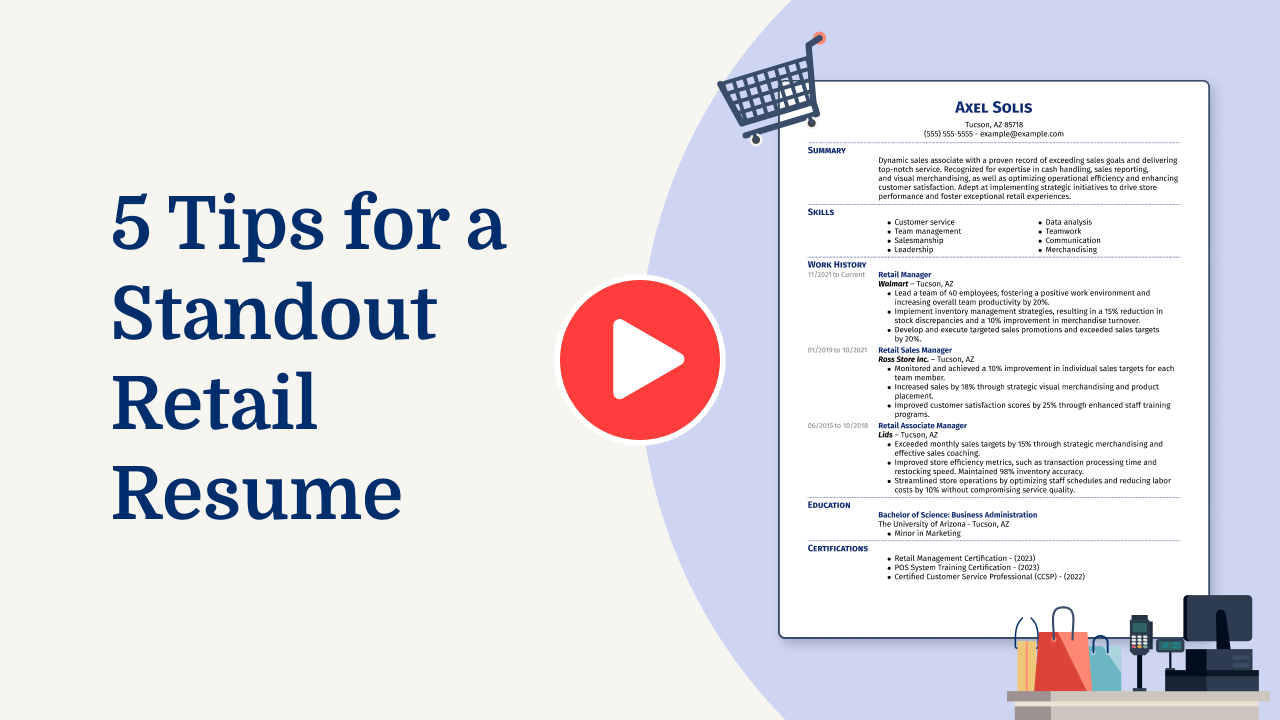
Write a strong professional summary
A professional summary on a resume serves as an introduction to hiring managers, offering a quick snapshot of your qualifications. When crafting your resume, you can choose between a summary and an objective based on your experience level and career goals.
A professional summary is typically three to four sentences that highlight your experience, skills, and achievements. It’s best for experienced applicants who want to show their professional identity and the value they bring. This section allows you to communicate what you’ve accomplished in your career.
In contrast, resume objectives are statements about your career goals and what you aim to contribute. They are ideal for entry-level applicants, career changers, or those with employment gaps. Where summaries focus on past achievements, objectives emphasize future contributions.
Next, we will provide examples of both summaries and objectives tailored for different industries and experience levels to help you craft the perfect introduction for your resume. Explore our professional resume examples for additional inspiration.
Retail manager resume summary examples
Entry-level
Recent business administration graduate with a focus on retail management from XYZ University. Completed internships at leading retail chains, developing skills in inventory management and customer service. Holds a certification in retail operations and possesses strong analytical and communication abilities aimed at improving store performance.
Mid-career
Retail manager with over seven years of experience managing high-volume store locations. Proven track record in increasing sales by implementing effective merchandising strategies and optimizing team workflows. Recognized for leadership in driving customer satisfaction and maintaining efficient inventory levels. Experienced in both brick-and-mortar stores and e-commerce integration.
Experienced
Seasoned retail manager with 15+ years of experience leading teams to exceed sales targets across diverse retail environments. Expertise in strategic planning, loss prevention, and staff development resulting in improved operational efficiency and profitability. Renowned for fostering an inclusive work culture that improves employee engagement and customer loyalty.
Retail manager resume objective examples
Entry-level
Ambitious and customer-focused individual with hands-on experience in retail sales seeking an entry-level retail manager position. Aspires to leverage strong organizational skills, a passion for team leadership, and a commitment to delivering exceptional customer experiences while driving store success.
Career changer
Dedicated professional transitioning from hospitality management into retail management, bringing a proven ability to handle fast-paced environments and lead diverse teams. Eager to apply transferable skills like inventory control, staff training, and customer service excellence to contribute to operational growth in the retail sector.
Recent graduate
Enthusiastic business administration graduate with internship experience in retail operations, aiming for an entry-level retail manager role. Ready to support store goals by implementing core knowledge of merchandising strategies, team coordination, and data-driven decision-making processes.
Build a standout resume in minutes with our easy-to-use Resume Builder. Choose a professional template, add your details, and make a strong impression on employers.
Include relevant certifications and training
Having certifications and training as a retail manager shows that you have the skills and knowledge to handle the job well. These credentials can help you stand out by highlighting your expertise in managing store operations, customer service, and team leadership.
They also show that you are committed to learning and improving in your career. Certifications give you an edge over others because they prove you know industry standards. Here are a few examples:
- Certified Retail Management Professional (CRMP)
- National Retail Federation (NRF) Certification
- Certified Sales Manager (CSM)
- Retail Operations Professional Certificate
- Customer Service Excellence Certification
Listing certifications in a dedicated section on your resume makes them easy for employers to see. This adds value to your education section by showing extra skills. Having these certifications can increase your chances of success as a retail manager.
Example of a certifications section
Certified Retail Management Professional (CRMP)
Issued by: National Retail Federation (NRF)
Issued 2022
Customer Service Excellence Certification
Issued by: American Management Association (AMA)
Expires 2025
Food Safety Manager Certification
Issued by: ServSafe
Issued 2021
Project Management for Retail Certification
Issued by: Retail Industry Leaders Association (RILA)
Issued 2023
Merchandising and Inventory Control Certification
Issued by: International Council of Shopping Centers (ICSC)
Expires 2026
Choose a polished and well-organized resume template that effectively showcases your skills and qualifications to stand out to hiring managers in your field.
Showcase your work experience
Highlighting work experience on your resume is important for a retail manager role, as it demonstrates your capability to handle responsibilities and achieve results.
When you list your job title, employer name, location, and employment dates in reverse chronological order, you offer a clear timeline of your career progression. Use action-oriented language to describe duties and achievements, allowing employers to quickly grasp what you bring to the table.
Focus on measurable outcomes when detailing your work experience to show how you’ve made an impact in past roles. For example, illustrate how you increased sales by a specific percentage or improved customer satisfaction scores. Include core duties such as managing staff, handling inventory, meeting sales targets, and ensuring excellent customer service.
Clear descriptions with specific examples make it easy for hiring managers to understand the influence you’ve had. Be concise but thorough by using bullet points for each job entry to keep information organized and readable. Highlight key skills like team leadership, sales strategies, budgeting, and problem-solving, which demonstrate you’re well-equipped for the retail manager position.
This method ensures that your resume effectively communicates your qualifications and readiness for the role while showcasing how you’ve previously succeeded in similar environments.
5 retail manager work history bullet points
- Led a team of 20 sales associates, achieving a 25% increase in monthly sales revenue by implementing targeted customer engagement strategies.
- Implemented inventory management system improvements that reduced stock discrepancies by 40%, improving product availability for customers.
- Developed and executed promotional campaigns resulting in a 30% boost in foot traffic during peak seasons.
- Streamlined store operations, reducing checkout times by 15% and improving overall customer satisfaction ratings.
- Conducted regular training sessions for staff on upselling techniques, resulting in a 20% increase in average transaction value.
Select a resume format that highlights your leadership skills, customer service expertise, and ability to drive sales as a retail manager.
Match your resume with the job description
Tailoring your resume to the job description is essential for standing out to employers and navigating applicant tracking systems (ATS). ATS software scans resumes for specific keywords and phrases, often pulled directly from job postings, to determine which applicants are most qualified. By customizing your resume, you increase your chances of being noticed.
An ATS-friendly resume is one that naturally incorporates relevant keywords and phrases from the job description within its content. These keywords should highlight your skills and experiences in alignment with what the employer seeks. To identify keywords, study the job posting carefully and make note of repeated skills, qualifications, or responsibilities.
For instance, if a retail manager’s role lists “inventory management,” “team leadership,” or “customer service strategies,” these terms are likely important. Incorporating these terms naturally involves weaving them into descriptions of your experience or achievements.
For example, instead of saying “Managed store operations,” you could say “Led daily store operations, including inventory management and customer service strategies.” This approach mirrors the language from the posting while showcasing your abilities. Targeted resumes improve your chances of passing ATS screening while demonstrating to employers that you’re a strong match for their needs.
Make your resume shine with our ATS Resume Checker, which finds ways to boost your score so it passes automated systems easily.
FAQ
Do I need to include a cover letter with my retail manager resume?
Including a cover letter with your retail manager resume can improve your application and increase your chances of landing an interview.
A cover letter gives you the chance to highlight why you’re a great fit for the store or company, sharing specific achievements like sales targets met or team leadership successes.
If the retailer is known for something unique, such as sustainable practices or customer service excellence, discuss how your experience aligns with these values.
Consider using our Cover Letter Generator to craft a personalized cover letter quickly, ensuring it complements your resume and highlights your strengths effectively.
Additionally, exploring various cover letter examples can provide inspiration and guidance on structure and content specific to the retail management field.
How long should a retail manager’s resume be?
As a retail manager, aiming for a one-page resume is often effective in capturing your key skills and achievements succinctly.
Highlight leadership qualities, sales performance improvements, and customer service expertise directly relevant to the role you’re pursuing.
If you have extensive experience or numerous accomplishments, a two-page resume may be appropriate to ensure all significant contributions are thoroughly documented.
Focus on recent positions and quantify results whenever possible, such as sales growth percentages or team development success.
Explore guidelines on how long a resume should be to refine your approach based on career stage and depth of experience.
How do you write a retail manager resume with no experience?
Creating a resume with no experience for a retail manager position can be challenging. However, you can focus on highlighting your transferable skills and relevant education. Use these strategies to develop an impressive entry-level retail manager resume:
- Highlight transferable skills: Focus on skills like leadership, communication, customer service, and problem-solving. These are important for a retail manager and can be gained from school projects or volunteer work.
- Showcase educational achievements: If you’ve studied business, management, or related fields, make sure to list those courses first. Include any honors or relevant coursework that aligns with retail management.
- Leverage any relevant experiences: Even if you haven’t managed a store before, mention any roles where you led teams or organized events—these show your potential as a manager.
See our guide on writing a resume with no experience for more detailed advice on crafting a resume specifically tailored to entry-level retail manager positions.
Rate this article
Retail Manager
Share this page
Additional Resources
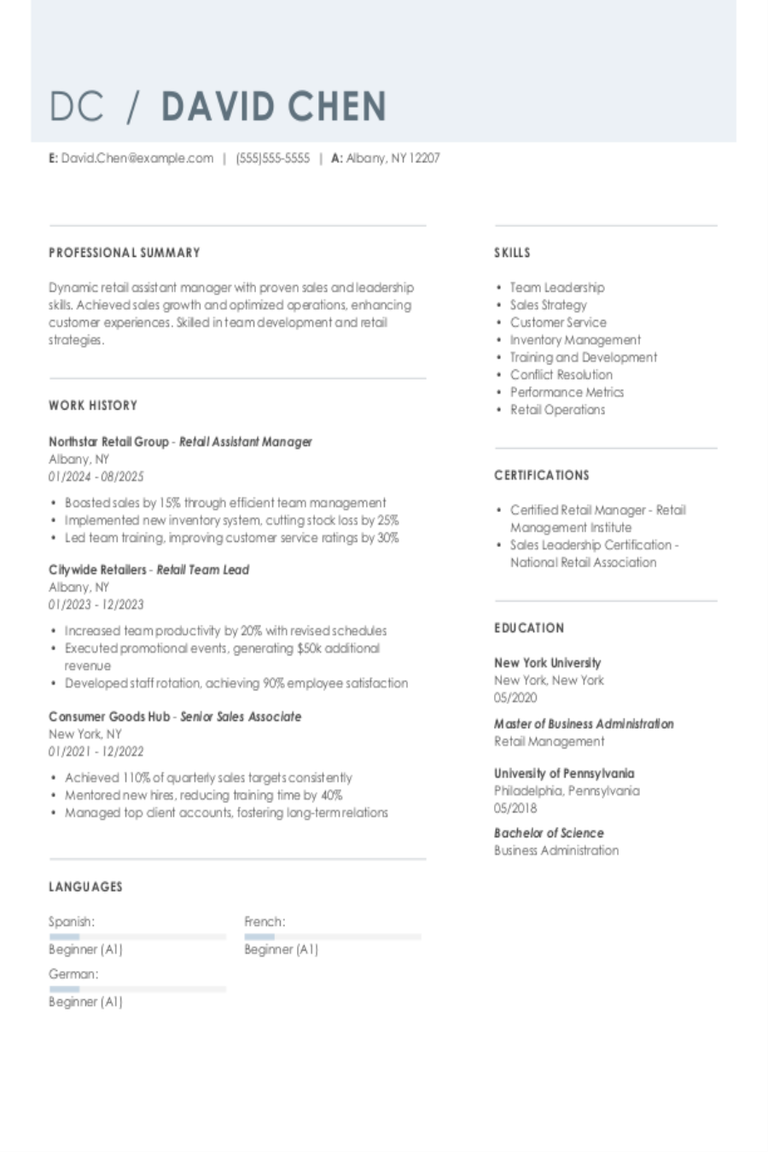
Retail Assistant Manager Resume Examples & Templates
Explore retail assistant manager resume examples to see how to highlight your experience handling customer service, managing inventory, and leading a team. Use these samples and tips to showcase your
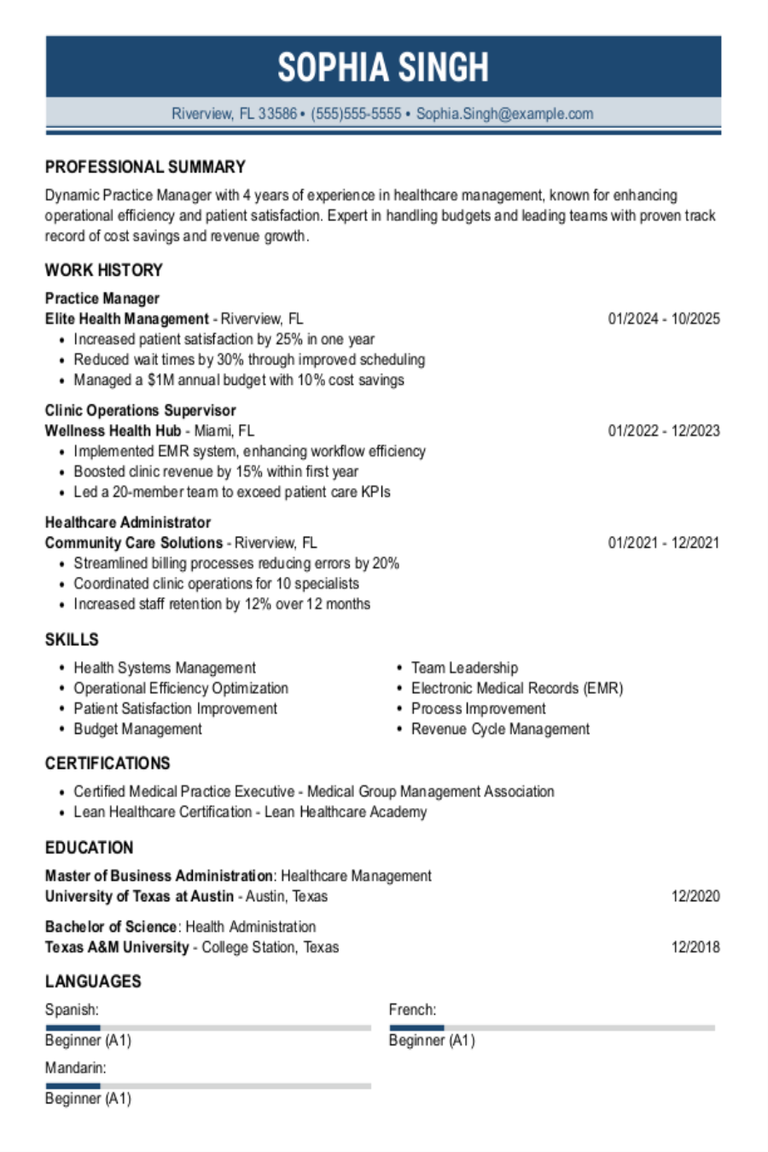
Practice Manager Resume Examples & Templates
Explore practice manager resume examples and tips to learn how to highlight your relevant skills and experience managing staff schedules and improving patient experiences.Build my resumeImport existing resumeCustomize this templateWhy

25 Interview Questions for Managers (With Answers & Tips)
Success in a management interview starts long before the conversation begins. Taking the time to prepare thoughtful responses to common interview questions for managers helps you clearly communicate leadership experience
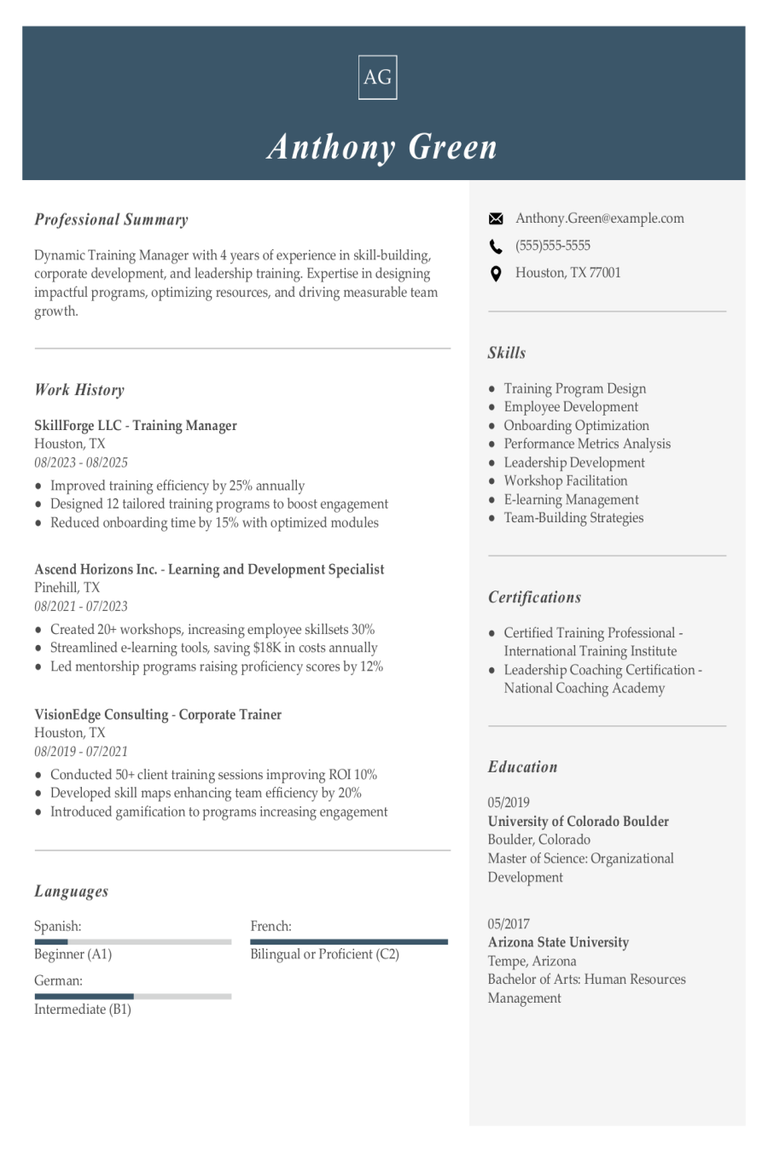
Training Manager Resume Examples & Templates
Discover how training managers showcase their skills in leading workshops and improving employee performance on their resumes. Our examples and tips will help you craft a resume that stands out
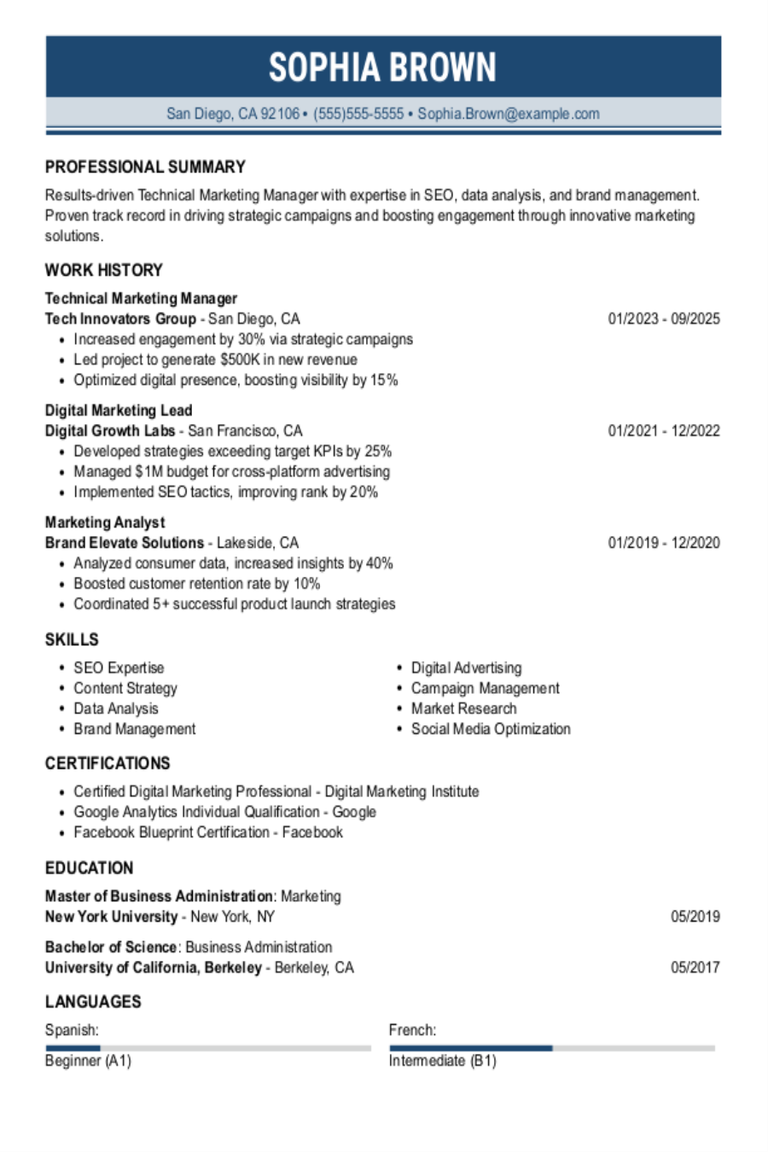
Technical Marketing Manager Resume Examples & Templates
Discover how to craft a technical marketing manager resume that shines. Learn to highlight your tech-savvy skills, marketing strategies, and project successes effectively.Build my resumeImport existing resumeCustomize this templateWhy this
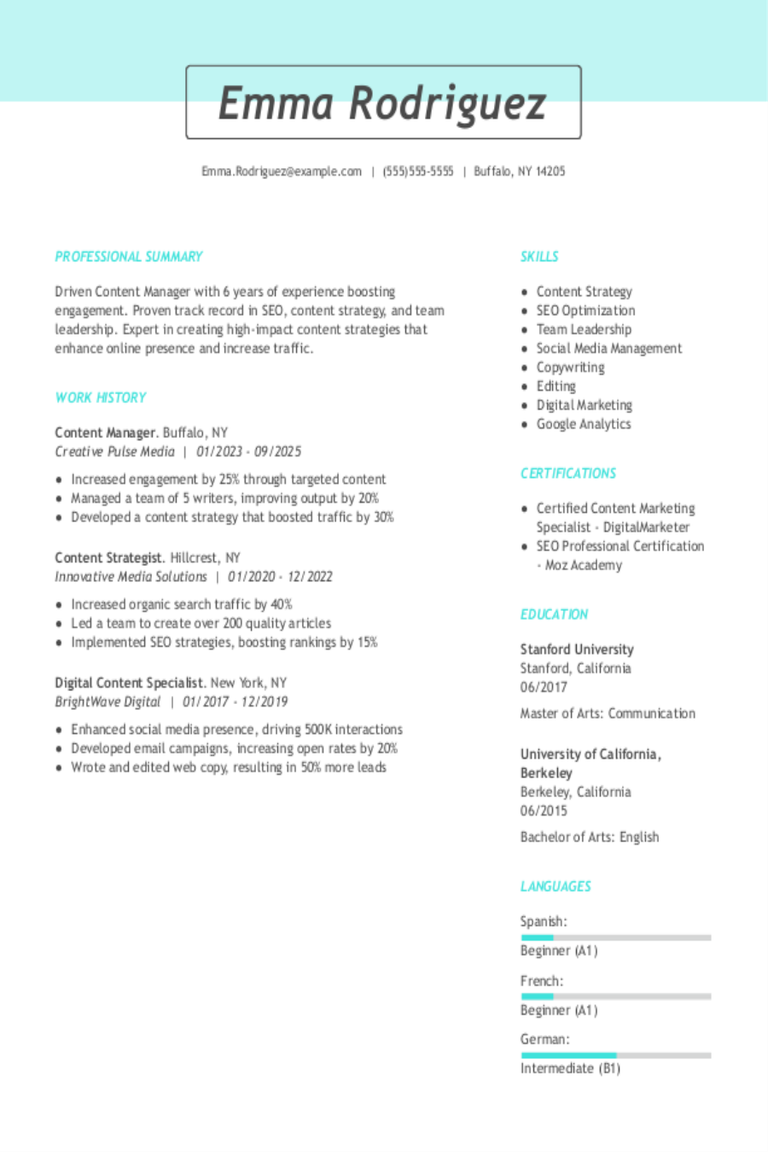
Content Manager Resume Examples & Templates
Browse content manager resume examples to see how to highlight your experience organizing, creating, and sharing engaging materials across platforms. These examples and tips help you showcase creativity, leadership, and
